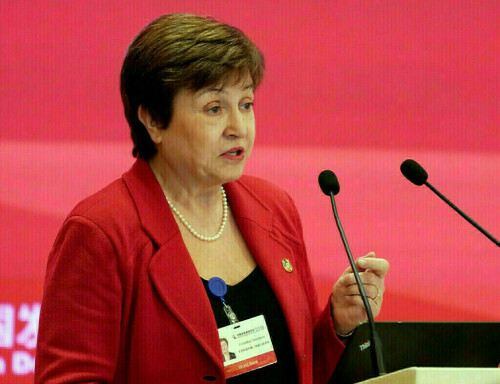Global Finance Leaders Seek Clarity on Trade Tensions
This past week in Washington, global financial leaders convened, seeking clarity on potential relief from President Donald Trump’s extensive tariff policies and their projected impact on the global economy.
The majority departed with lingering uncertainties.
Many attendees at the International Monetary Fund and World Bank Spring Meetings perceived ongoing inconsistencies within the Trump administration regarding demands from trading partners affected by the tariffs.
Throughout the busy week, numerous finance and trade ministers attempted meetings with the US Treasury Secretary and other leading administration figures, often without success.
Those who secured meetings were generally advised to remain patient, despite the diminishing timeframe of the 90-day suspension on the most substantial levies initially granted by Trump.
Despite the Trump administration’s claims of receiving 18 written proposals and conducting extensive negotiations, no agreements were ultimately reached during the week.
European Concerns
“We are not negotiating; we are just presenting and discussing the economy,” stated Polish Finance Minister Andrzej Domanski, highlighting the detrimental effects of uncertainty on Europe and the United States.
Warnings regarding the potential harm of tariffs—25% on US imports of vehicles, steel, and aluminum, and 10% on most other goods—to the US and other major economies were largely disregarded by US officials.
IMF Chief on Policy Challenges
“We know that they anticipate that it won’t be as bad,” Domanski noted. “They seem to believe it’s a short-term sacrifice for a long-term gain. I worry that we will experience short-term pain followed by long-term pain.”
The Trump administration’s primary trade discussions during the week involved Japan and South Korea; however, these discussions yielded no definitive outcomes, although the Treasury Secretary described them as “productive.”
While specific currency targets for the Japanese yen were not addressed, both nations’ currency strategies are likely to be discussed in future talks, as the US views currency weakness against the dollar as a barrier to American exports.
The IMF adopted a somewhat more optimistic outlook regarding the economic repercussions of the elevated US tariffs, reducing growth predictions for numerous countries in its World Economic Outlook but stopping short of predicting recessions, even for the US and export-dependent China, which is now subjected to tariffs on various goods.
IMF Managing Director Kristalina Georgieva acknowledged that member countries were concerned about the global economy’s uncertainty, intensified by the pandemic, inflation, and conflicts but hoped that trade negotiations might alleviate the tariff tensions.
“We acknowledge that efforts are underway to address trade disputes and mitigate uncertainty,” Georgieva told reporters.
“Uncertainty negatively impacts business, so the sooner this cloud hanging over us is lifted, the better it will be for profit, growth, and the global economy.”
Several finance officials informed that recession probabilities were greater than the IMF’s calculated 37%.
Rising Debt Risks
Eric LeCompte, executive director of Jubilee USA Network, suggested that the IMF’s projections were primarily intended to prevent market panic, despite private concerns among officials regarding potential new debt crises.
“It was largely an unproductive week,” LeCompte commented, noting that debt discussions were inconclusive and overshadowed by tariff-related negotiations.
Reza Baqir, who leads sovereign debt advisory at Alvarez & Marsal, noted a palpable sense of despair among developing nations regarding the lack of focus on Financing for Development.
World Bank chief economist Indermit Gill cautioned against increasing debt levels in emerging markets, pointing out that tariffs had led to a significant decrease in trade and foreign direct investment, essential for growth in developing countries.
He, along with other World Bank and IMF representatives, advised countries to lower their tariffs to stimulate economic growth.
US Commitment to International Institutions
Policymakers were relieved when the Treasury Secretary voiced US support for the IMF and the World Bank, recognizing their “enduring value” but also criticizing their involvement in climate, gender, and equality issues.
Rather than disengaging from these institutions, the Secretary expressed a desire to refocus them on their fundamental missions of economic stability and development, advocating for expanded World Bank energy financing options and an end to loans for China.
Meeting participants and financial markets were encouraged by the Secretary’s earlier remarks that triple-digit US tariffs on Chinese goods were untenable, raising hopes for an imminent resolution.
However, China refuted claims of ongoing tariff negotiations with Beijing, adding to the week’s confusion and providing little reassurance to country delegations.
“I believe many left bracing for a deterioration in the economic outlook,” commented Josh Lipsky, a former IMF advisor.
“The overall perspective, in hindsight, is quite troubling.”
A key challenge for developed nations was the recent selloff in US Treasury debt, which signaled a decline in confidence in US economic strategies, Lipsky added.
He emphasized that trust in US economic leadership was pivotal to the dollar’s status as a reserve currency, suggesting that trading partners may seek alternatives if this trust is not restored.



Comments (0)
No comments yet. Be the first to comment!
Leave a Comment